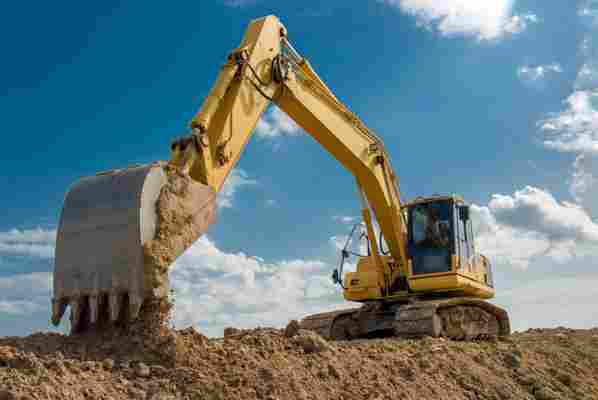Do You Know Anything About These Heavy Construction Equipment Types?

Different types of heavy equipment are used when it comes to various construction, earthmoving, and other types of projects. The selection of these heavy construction equipment types depends on the size and nature of the project one is working on. By utilizing heavy equipment, a job can be made much easier and prove to be more time-efficient.
Let’s take a look at five different heavy construction equipment types that we train our students on, how they’re used, and what they’re used for. And don’t miss out on the first part of this series.
Bulldozer
A bulldozer is a type of tractor that is equipped with a metal plate also known as a blade, which is used to push all kinds of dirt, sand, and other material during construction work. It is typically equipped with a claw-like device on the rear side of it. This device is typically used to loosen densely compacted materials.
Bulldozers are stationed on tracks, which gives them excellent ground holding capability and mobility when it comes to rough terrain and slopes. The wide tracks help distribute weight over a large area, preventing it from sinking into soft ground.
Excavator
An excavator is a piece of heavy construction equipment that consists of a boom, dipper, bucket, and cab on a rotating platform that’s commonly referred to as the “house.” The house sits on top of an undercarriage that has tracks or wheels.
Excavators are used in many ways. Some of these include digging trenches, holes, or foundations, the handling of material, for forestry work, construction, demolition, and more.
Motor Grader
A motor grader is a construction machine that has a long blade that is used to create flat surfaces during the grading process, which is the process of ensuring a level base or foundation when it comes to construction work. Graders of the past used to be towed behind horses or other powered equipment, but eventually were built to contain an engine and became called motor graders as a result.
Motor graders are commonly used in the construction and maintenance of dirt and gravel roads. When it comes to the construction of paved roads, they are used to prepare the base course to create a wide flat surface upon which to place the road surface.
Loader
A loader is a type of heavy construction equipment that is usually wheeled but can sometimes be on tracks, and has a front-mounted square wide bucket that’s connected to the end of two arms. It’s commonly used in construction settings to move aside or load materials such as asphalt, demolition, debris, dirt, snow, gravel, and much more. Loaders will typically take this material from the ground level and deposit it into an awaiting dump truck or open trench excavation.
The bucket on a loader can be replaced with other tools or equipment such as mount forks or a clamshell bucket, as needed. Loaders are not the most efficient machine for digging as they cannot dig very deep below their wheel level like a backhoe or excavator is capable of.
Scraper
A scraper is a large piece of equipment that is used in mining, construction, agriculture, and other earthmoving applications. The rear part of a scraper has a vertically moveable hopper with a sharp horizontal front edge which can be raised or lowered. The front edge cuts into the soil and fills the hopper. Once the hopper is full, it gets raised, closed, and then the scraper can transport it to the area where it’s being dumped.
Scrapers are efficient when it comes to short hauls where the cut and fill areas are close to one another.
Careers in Which This Equipment is Used
If you’re using the equipment mentioned above, you’re likely to be working in a heavy equipment operator role in the construction, landscaping, agriculture, demolition, or forestry industries. These roles continue to grow as the job outlook over the next decade shows an expected increase of around 10 percent.
Training Courses at Performance Training Solutions
At Performance Training Solutions, we offer four three-week-long training courses that allow you to develop the skills and knowledge required to become certified to operate heavy equipment. In order to learn how to operate the five pieces of heavy equipment that were covered above, an individual would have to enroll in our Heavy Equipment Operator II course. This is the second part of a six-week-long, 240-hour commitment that requires you to stay local to Columbus, Ohio until completion of the course. Heavy Equipment Operator II is taken after completing Heavy Equipment Operator I, in which you learn to operate skid steers, wheel loaders, compactors, backhoes, and off-road dump trucks.
Get Started On the Path to a New Career with PTS
Performance Training Solutions is a heavy equipment operator school located in Columbus, Ohio. As one of the top training schools in the country, we assist those who wish to pursue a career as a heavy equipment operator, crane operator, or a commercial truck driver. Our team of experienced trainers and admissions and career representatives are committed to helping our students succeed.
If you’re interested in either of the courses mentioned above or any of our additional courses, check out what you can expect. If you’d like to learn more about Performance Training Solutions, feel free to contact us today. Don’t forget to ask us how you can earn $500 off your tuition by scheduling a tour.